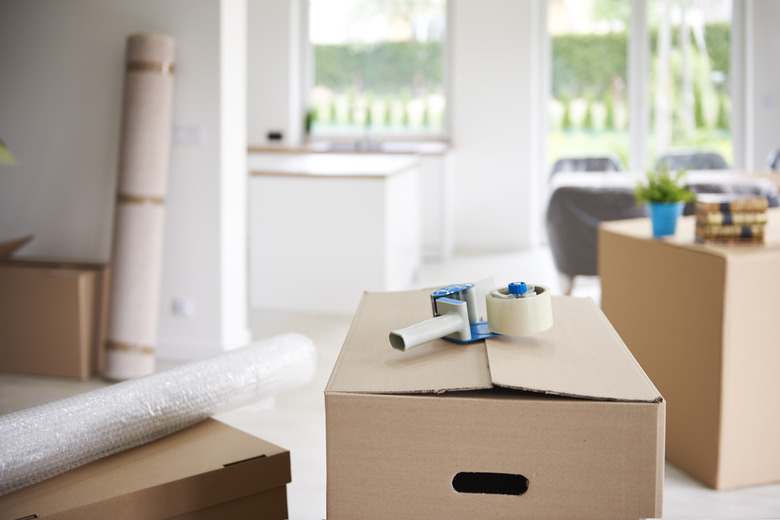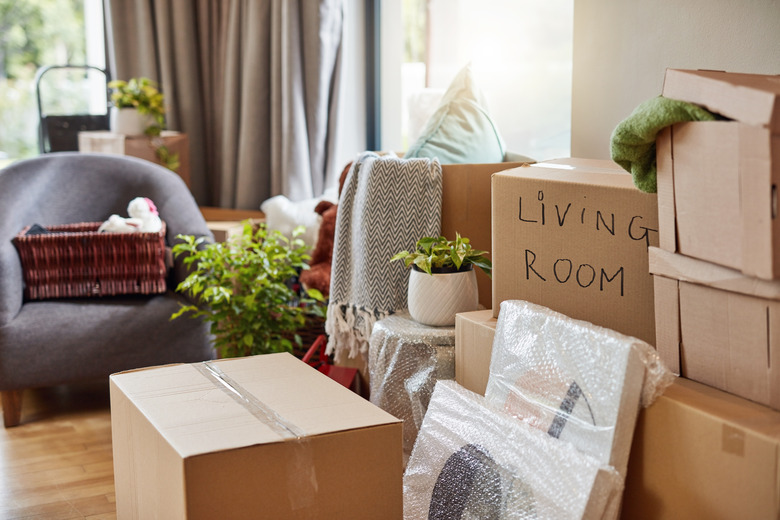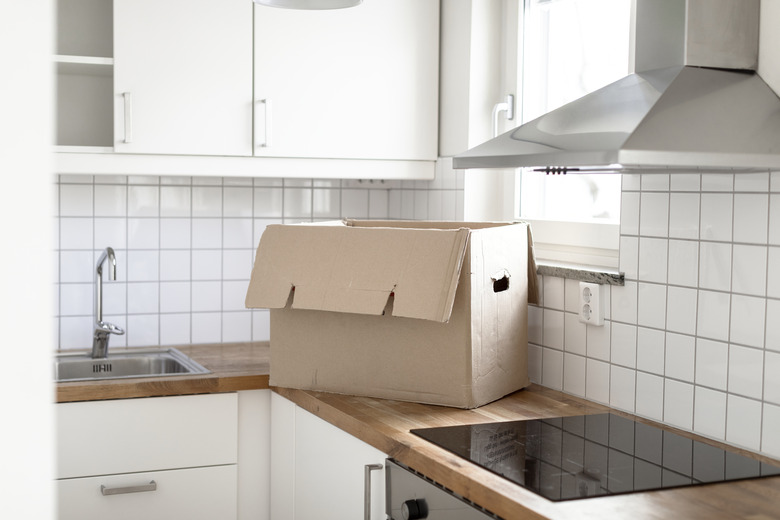13 Moving And Packing Tips For Your Easiest Move Ever
We may receive a commission on purchases made from links.
Whether you're relocating down the street or across the country, moving is a stressful process — it's enough to give you a few gray hairs and warrant a relaxing post-move spa day to de-stress. Luckily, there are several moving and packing tips that can make the process much easier. Use these helpful tips to avoid major headaches throughout the process while making your next move an absolute breeze. Not only will you save time and money but you'll also have a surprisingly pleasant moving experience.
1. Purge in Advance
1. Purge in Advance
A few months (or more) before your big move, sit down and focus on decluttering and purging your things. Go through every space in your house, including closets, and focus on getting rid of things that you no longer need. If you haven't used it in a year or more, let it go. When you're going through your belongings, separate items into four categories:
Keep: You will probably end up wanting to keep a majority of the things you have in your possession — you got it for a reason, after all. But try to only keep things that make you happy or that you use on a regular basis. It's sometimes helpful to take the Marie Kondo approach by looking at each item individually to see how it makes you feel.
Sell: Sell items in good condition online. Selling is a great option if you have a prized possession you want to get rid of because selling it rather than giving it away somehow makes it a little easier to let go. Plus, you can put any money you make toward your moving costs to soften the blow.
Donate: Consider donating gently used clothing, toys, and household goods to charities or nonprofits that could use them. A lot of donation centers, like Goodwill, will give you a tax receipt so that you can claim your donation on next year's tax return.
Throw away: Toss any garbage you find as well as items that are no longer usable. Check with your local recycling center to see which materials you can recycle to keep your purge as eco-friendly as possible. Some donation centers will accept broken electronics and other e-waste to recycle on their own.
Purging will reduce the amount of stuff you have to move, and doing it in advance means you won't have yet another task to complete while you're packing your belongings. If you want to make your move easier, absolutely do not disregard this moving and packing tip — it's a surefire way to make the process less stressful.
2. Make a Plan of Action
2. Make a Plan of Action
When it comes to moving and packing, organization is key. Plan absolutely everything you can think of, from a timeline of events to specifics on how you'll label your boxes to what you'll have for dinner that first night in your new house or apartment. Write (or type) it all down in one notebook, label it with "moving day" and the year, and keep it somewhere safe. It's helpful to keep all of your moving documents in one place so that you'll know just what to grab when it's needed.
3. Keep Track of Paperwork
3. Keep Track of Paperwork
There are so many details involved with moving and packing. Keep contracts from moving companies, receipts, and any other paperwork all together in one place. Head to the office supply store and grab a binder to dedicate to your move (or designate a folder in your Google Drive). Label it and use it to store all of your important documents. If you made a plan of action for your move, keep it in the binder. That way, when the big day arrives, you'll be able to find details easily if (or when) there's a hiccup in your plans.
4. Label Everything
4. Label Everything
Packing and moving is a major hassle whether you're doing all the work yourself or leaving most of the heavy lifting to professional movers. To make things easier for everyone, label everything — yes, everything. Break out that trusty label maker and get to work. Pack by room and label boxes with their corresponding room, like "living room" or "kitchen."
Another tactic is to label boxes with what's inside — for example, "kitchen gadgets" or "books." The more accurate you can make your labels, the better. Then, the movers (or you) will know just where to put the boxes when unloading the moving truck. And when you're ready to unpack, there will be no time-consuming shuffling around because you'll know where things go.
5. Plan Ahead and Consider Hiring Professional Movers
5. Plan Ahead and Consider Hiring Professional Movers
Hiring professional movers is an added cost, but many homeowners and renters think it's worth it. Lifting heavy furniture and toting around bulky boxes is back-breaking work. Professionals have the tools and equipment to get the job done easily and safely, so it's easier on you to let them handle it. If you're worried about costs, moving companies often have deals to help you save. For example, most movers will let you pack your own boxes for a discount, and they will just move them from point A to point B.
Tip
If you do decide to hire professional movers, book them as soon as possible. For long distance moves, try to book movers at least two months before your moving date. You can wait until a few weeks out for short-distance moves. Hiring them early will ensure your dates are available. You can lock in your prices, and you have time to get your contract and other paperwork in order in time for the big day.
6. Take Pictures
6. Take Pictures
Snap photos of the contents of every box you pack and every furniture piece you plan to move, especially any valuables, like electronics and artwork. If the moving company you hire loses or damages your items en route to your new home, you'll have a record of their original condition so you can easily make an insurance claim. If you have accurate documentation and arrive at your new place to find a cracked TV, there will be no doubt about who is to blame. Those situations are always a headache, and unfortunately, they are often a part of moving. By being prepared, you'll make the process a whole lot easier for yourself, and you'll have a far better chance of getting reimbursed.
7. Pack Early
7. Pack Early
Start packing your boxes as early as possible, starting with items you won't need before you move, like holiday decorations. Leave commonly used items, like towels and your daily cookware, until the last minute. Experts suggest starting to plan your packing process six weeks before the big day, with actual packing beginning at least three weeks beforehand.
8. Know Whom to Notify
8. Know Whom to Notify
There are so many moving parts to keep track of during a move. Because of that, it's easy to let the seemingly less important stuff fall to the wayside. Notifying people of your address change is just one of those seemingly unimportant tasks, but in fact, it's an essential step. Make a list of whom you need to notify before you start getting into the thick of moving so that you can send out your notices before you get too stressed. Some people and entities you need to notify of your new address and moving date include:
- Close friends and family members
- Your employer
- Gas, electric, and water companies
- Banking and financial institutions
- Phone, cable, and internet providers
- Post office
- Insurance companies
9. Assemble a "First Night" Box
9. Assemble a "First Night" Box
To avoid rifling through packed boxes for essentials when you first arrive in your new house or apartment, put together a "first night" box. Pack a suitcase with all of the most important items you think you'll need during your first day or two at the new home. Include things like:
- Toiletries
- Medications
- Pet supplies
- Important documents
- A change of clothes
- A basic tool kit
- Snacks
- Commonly used electronics (think phones and computers) plus their chargers
- Toilet paper
- Paper towels
- Garbage bags
If there's one moving and packing tip you embrace, make it this one. The amount of stress a "first night" box knocks out is off the charts.
10. Invest in Quality Moving Supplies
10. Invest in Quality Moving Supplies
Having a box break while you're lugging it downstairs is a nightmare situation during a move. Do yourself a favor and invest in quality moving supplies and packing materials so you won't have to worry about anything breaking during the already stressful process of packing and moving. While it may be tempting to score free cardboard boxes that were used by neighbors or salvaged from the grocery store recycling bin, you could end up with flimsy cardboard or, even worse, a bug infestation. Investing in sturdy cardboard boxes will give you peace of mind while you pack and move your belongings, especially if you have a lot of breakable items.
Also, make sure to stock up on packing supplies, like packing tape and labels, before you start the moving process. No one wants to trudge out to the store in the middle of an already hectic packing or moving day.
11. Pack Clothes in Wardrobe Boxes
11. Pack Clothes in Wardrobe Boxes
While you can certainly take your clothes off the hangers, fold them, and pack them into boxes or suitcases, it's an easier process to pack them in special wardrobe boxes. Most home improvement stores and several online retailers sell wardrobe boxes that come with a built-in hanging rod or bar. This allows you to transfer the clothes hanging in your closet directly to a moving box, where you can actually hang the clothes instead of cramming them into a box where they could get damaged and wrinkled. (It'll also save you the hours of unpacking it'll take to remove all of the clothing from the boxes and then hang them back up.)
When they arrive at your destination, you can simply open the box and hang them right in your closet with little effort — and you won't have to worry about how to pack your awkwardly shaped clothes hangers.
Tip
If you want to save a bit of money on boxes, you can wrap groups of clothing that are hung up in your closet in a trash bag. Simply start from the bottom of the clothes and work your way up, using the tie on the garbage bag to keep all of the hangers together.
12. Set a Timer
12. Set a Timer
Packing up your entire home is a daunting task. Just looking at all the things you have to move can feel overwhelming, which is enough to make you procrastinate — a recipe for a stressful move. To get the ball rolling, set a timer and pack for an hour a day. If you need to increase that over time, feel free. But setting a timer at first will help you get started and help you reach your goal of getting packed and ready well before the deadline.
13. Pack Heavy Items in Small Boxes
13. Pack Heavy Items in Small Boxes
Although you might be tempted to use fewer boxes for your move, packing heavy items in a large box can lead to overexerting yourself — or a broken box. Be sure to pack items like books, cast iron pans, tools, or other hefty objects in smaller boxes with plenty of packing tape to reinforce the load.



